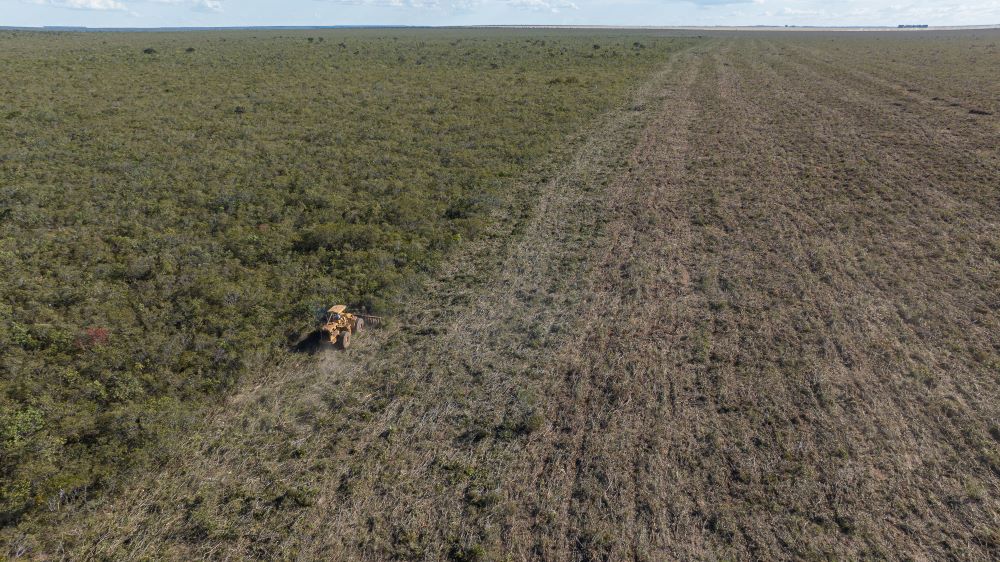
Earthsight’s investigation found that items of cotton clothing and homeware sold in Zara and H&M have been linked to deforestation and illegal farming practices in Brazil.
The investigation analysed satellite images, court rulings, shipment records and visited global trade shows undercover for more than a year. Their work traced nearly a million tonnes of cotton from “notorious estates” in Brazil to clothing manufacturers in Asia that supply both H&M and Zara.
The investigators also allege that some of the cotton in question was certified as ‘sustainable’ by Better Cotton.
Where was the cotton grown?
The farms highlighted in the report are said to be amongst Brazil’s largest cotton producers and are based in the country’s Cerrado region, home to 5% of the world’s species.
More than half of the Cerrado region has been cleared for industrial-scale agriculture in recent decades. The Brazilian government estimates that the destruction has created a climate impact equivalent to 50m more cars on the road each year.
Deforestation in the Cerrado region increased by 43% in the last year. Earthsight claims “almost all” of this is illegal.

US Tariffs are shifting - will you react or anticipate?
Don’t let policy changes catch you off guard. Stay proactive with real-time data and expert analysis.
By GlobalDataCotton is now “routinely” grown in the region, often in rotation with soy crops. Brazil is now expected to overtake the US as the world’s largest cotton exporter by 2030.
Where was the cotton used?
Earthsight tracked 816,000 tonnes of cotton produced in the region to eight Asian manufacturers over 12 months. The cotton was made into finished clothing for global retailer giants H&M and Inditex, including items for brands such as Zara, Bershka and Pull & Bear.
The investigation also alleges that the cotton in question was certified as sustainable by Better Cotton, as most H&M and Zara products carry the certification.

How has Better Cotton responded to Earthsight’s claims?
Earthsight claimed that Better Cotton’s certification’s rules are “riddled with holes, conflicts of interest and weak enforcement”.
“Cotton from land illegally deforested before 2020 can still qualify as ‘better’, even if it was stolen from local communities,” Earthsight said.
Better Cotton told Just Style that it has launched an enquiry following Earthsight’s report, including a third-party audit of three farms highlighted by the investigation.
It said it will require time to analyse its findings and plans to share further comment when its review has completed.
The organisation also said that Earthsight’s report includes “fires that took place on farms that are not Better Cotton related and that have since been overturned”.
Better Cotton also told Just Style that it plans to make a summary of its audit available to Earthsight and all its members.
A spokesperson for the organisation said: “Certain issues raised in the report do support our existing priority to enhance due diligence with partners especially with regards to land conversion, illegal deforestation and local community impact. We are working with stakeholders to strengthen mechanisms for oversight processes including more rigorous reviews and cross-checks of partner alignment with Better Cotton’s Standard.
“Consumers and the brands that supply them must have confidence that the cotton in their clothing is produced responsibly. We will continue to work with farmers, governments, and the industry at large to lift standards in Brazil and around the world.”
How have Inditex, H&M responded?
A spokesperson from Inditex told Just Style: “We are committed to upholding best practice in the textile industry. We take the allegations against Better Cotton extremely seriously and we urge them to share the outcome of their third-party investigation as soon as possible and take any necessary measures to ensure a sustainable cotton certification that upholds the highest standards.”
According to Reuters, Inditex also wrote a letter to Better Cotton’s CEO earlier this year, asking for clarification on the organisation’s certification processes.
A spokesperson from H&M told Just Style: “The findings from Earthsight’s report are highly concerning and we take these very seriously.”
“H&M Group was one of the first brands to move to 100% organic, recycled, or sustainably sourced cotton. However, this is not where the journey ends and the report clearly highlights the need for all actors to continue the work to further improve standards and traceability systems, which we fully support.”
The spokesperson added that H&M is “in close dialogue” with Better Cotton, following its own investigation into Earthsight’s findings.
What does this mean for the wider apparel sector?
Earthsight’s director Sam Lawson said: “If you have cotton clothes, towels or bed sheets from H&M or Zara, they may well be stained by the plundering of the Cerrado. These firms talk about good practice, social responsibility and certification schemes, they claim to invest in traceability and sustainability, but all this now looks about as fake as their high street window arrangements.
“It has become very clear that crimes related to the commodities we consume have to be addressed through regulation, not consumer choices. That means lawmakers in consumer countries should put in place strong laws with tough enforcement. In the meantime, shoppers should think twice before buying their next piece of cotton clothing.”
While the EU’s Corporate Sustainability Due Dilligence Directive (CSDDD) will create an increased need for transparency in supply chains, only the largest firms will be covered by the rules.
Fashion brands have previously been accused of failing to act against deforestation in Brazil.



